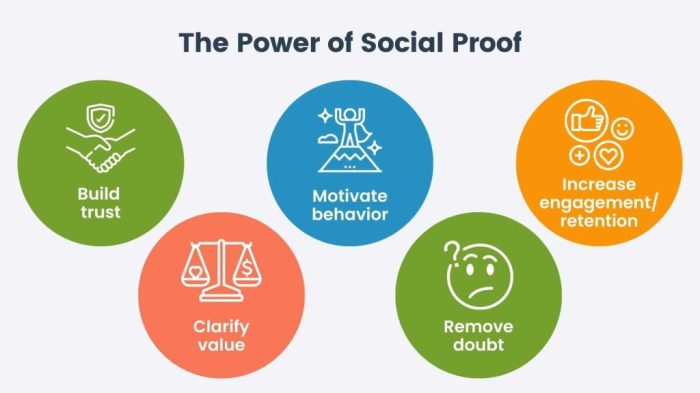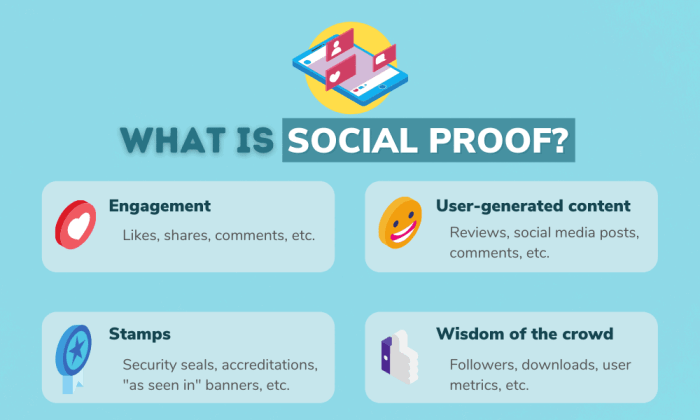Social Proof Strategies take the spotlight as we dive into the world of marketing tactics, unveiling the power of influence and credibility in captivating your audience. Get ready to explore the psychology behind consumer behavior and the secrets to leveraging social proof for success.
Definition of Social Proof Strategies
Social proof strategies are marketing techniques used to influence consumer behavior by showcasing the positive experiences and actions of others. These strategies leverage the psychological phenomenon where people tend to follow the actions of the masses, assuming that those actions are the correct behavior in a given situation.
Examples of Popular Social Proof Strategies
- Customer reviews and testimonials on websites and products
- Displaying the number of social media followers, likes, and shares
- Using celebrity endorsements or influencer partnerships
- Showcasing case studies and success stories
Psychology Behind the Effectiveness of Social Proof
Social proof is effective in influencing consumer behavior because it taps into the human need for social validation and conformity. When individuals see that others are engaging with a product or service positively, they are more likely to follow suit as a form of social proof. This phenomenon is deeply rooted in the concept of social influence and the desire to belong to a group or community.
Types of Social Proof

Social proof comes in various forms and can greatly influence consumer decision-making. Let’s explore some of the different types of social proof and their impact on businesses.
Testimonials
Testimonials are statements from satisfied customers endorsing a product or service. They are powerful as they provide real-life experiences that build trust with potential customers. Businesses often display testimonials on their websites to showcase positive feedback.
User Reviews
User reviews are feedback and ratings left by customers on platforms such as Yelp, Google Reviews, or Amazon. These reviews can significantly impact consumer decisions as they provide insights into the quality and reliability of a product or service. Businesses with high ratings are more likely to attract new customers.
Social Media Followers
Having a large following on social media platforms like Instagram, Facebook, or Twitter can serve as a form of social proof. Businesses with a significant number of followers are perceived as popular and trustworthy. Consumers are more likely to engage with brands that have a strong social media presence.
Celebrity Endorsements, Social Proof Strategies
When a well-known celebrity or influencer promotes a product or service, it can have a massive impact on consumer behavior. Celebrity endorsements create credibility and can significantly increase brand awareness and sales. Businesses often collaborate with influencers to leverage their social proof.
Case Studies
Case studies provide detailed accounts of how a product or service has helped a specific customer or business achieve success. They offer in-depth insights into the practical benefits of a product or service and can influence potential customers by showcasing real-world results. Businesses use case studies to demonstrate their value and expertise.
Comparative Social Proof
Comparative social proof involves showcasing how a product or service outperforms competitors. This type of social proof highlights the unique selling points of a business and can sway consumer decisions by demonstrating superiority in quality, price, or features. Businesses use competitive analysis to position themselves as the best choice in the market.
Implementing Social Proof Strategies

To effectively implement social proof strategies on a website or marketing campaign, follow these steps:
Gathering Social Proof
- Encourage satisfied customers to leave reviews or testimonials on your website or social media platforms.
- Utilize social media influencers or celebrities to endorse your products or services.
- Showcase customer success stories or case studies to demonstrate the positive impact of your offerings.
Showcasing Social Proof
- Display customer testimonials prominently on your website, preferably on the homepage or product pages.
- Create a dedicated section for reviews and ratings to build credibility and trust with potential customers.
- Utilize user-generated content such as photos or videos of customers using your products/services.
Importance of Authenticity and Transparency
Authenticity and transparency are crucial when using social proof in marketing:
- Ensure that the testimonials and reviews are genuine and from real customers to maintain trust.
- Avoid fabricating or exaggerating social proof as it can damage your brand reputation in the long run.
- Be transparent about any partnerships or collaborations with influencers to maintain credibility.
Measuring the Impact of Social Proof: Social Proof Strategies
To determine the effectiveness of social proof strategies, it is crucial to measure their impact accurately. By tracking key performance indicators (KPIs) and utilizing various tools and techniques, businesses can optimize their social proof strategies for maximum results.
Tracking Key Performance Indicators (KPIs)
- Conversion Rate: Measure the percentage of visitors who take a desired action after viewing social proof, such as making a purchase or signing up for a newsletter.
- Click-Through Rate (CTR): Monitor the percentage of users who click on a call-to-action link within the social proof content.
- Engagement Metrics: Analyze metrics like likes, shares, comments, and retweets to gauge the level of audience engagement with social proof.
Tools and Techniques for Monitoring and Optimizing
- Google Analytics: Utilize Google Analytics to track website traffic, user behavior, and conversion rates related to social proof campaigns.
- Social Media Insights: Monitor social media platforms for engagement metrics to assess the impact of social proof content.
- A/B Testing: Conduct A/B tests to compare different social proof strategies and determine which ones are most effective in driving desired actions.
- Surveys and Feedback: Collect feedback from customers to understand their perception of social proof and its influence on their decision-making process.